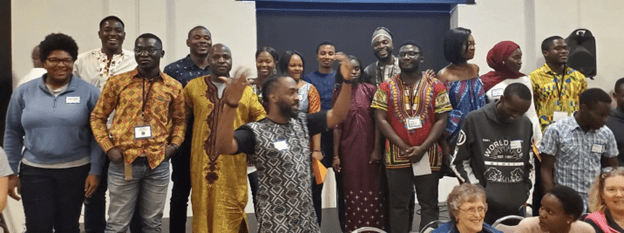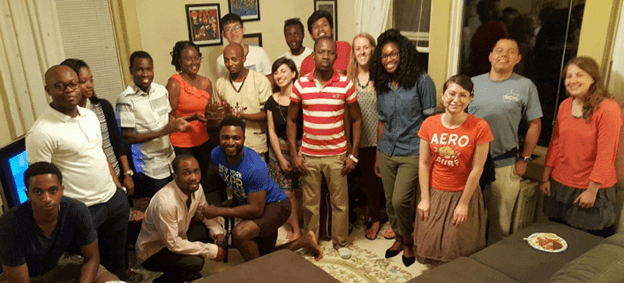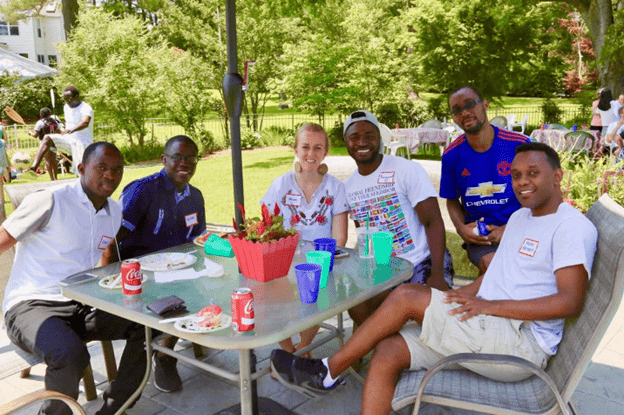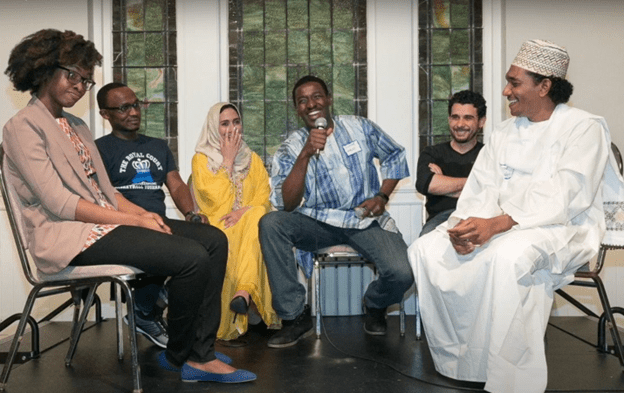
Emmanuel Ambané Jr. and his wife Allison build multiethnic faith communities with students and faculty in Hampton Roads, Virginia. In this article, the fourth in a series, he focuses on the unique contributions of the African church to the global church.
While it was said at the World Missionary Conference of Edinburgh (WMCE) in 1910 that Africa was a place of no hope for the Gospel because of the strong growing presence of Islam, many people may be surprised to hear that, today, Africa is the continent with the largest number of Christians. The global voices, disproportionally represented at WMCE, included just one African delegate, zero delegates from Latin America, fewer delegates from India, Japan, and China, 500 British, 500 Americans, and 170 delegates from continental Europe. Today 631 million Christians live in Africa, and an additional 131 Million African Christians living in the diaspora. The main question this article will answer is the danger of excluding global voices from the Table of Nations. To put it differently, what is the global church missing when she omits the church’s gifts or when she focuses exclusively on negative stereotypes of Africa associated with diseases, disasters, and despair?
The African proverb: “Until the lion learns how to write, the story will always be told by the hunter,” reminds us of the danger of the one-story narrative, which does not represent the full story in any given situation. This one-sided narrative driven by statements such as “The church in Africa is a mile wide and an inch deep” deprives Western churches of experiencing the gifts of the African church.
In transit through the United Arab Emirates (UAE) on his way to the U.S., Aboelo, a missionary sent by his church in Nigeria, was asked about the purpose of his visit to the U.S by some Americans in the UAE. When Aboelo told them that he was coming to the U.S. as a missionary, the Americans told him that they were shocked to hear about missionaries coming to the U.S. They told Aboelo that they usually hear about Americans going to other countries as missionaries and not the other way around. This interaction between Aboelo and that group of Americans in the UAE reminds us that the traditional flow of mission from the West to the Rest continues to shift from the everywhere to anywhere. Maybe these Americans in the UAE assumed that the world needs America and not the other way around.
Along with his faculty duties at Hampton University in Virginia, Aboelo has turned his office into a worship sanctuary where he welcomes his faculty colleagues and students. Furthermore, Aboelo hosts a multi-ethnic church service in-person and virtually, joined by students. Recently, a Ph.D. student and his wife from South Korea from Aboelo’s fellowship have been applying for faculty positions on the East Coast, intending to spread the Gospel on their campuses.
The testimony of Aboelo is a beautiful reminder that God uses people from every nation to set his big table for the banquet of nations.
Gifts of Family
Among the most valuable gifts African immigrants contribute to the church in America is their close-knit, communal lifestyle. Rooted in the Ubuntu philosophy, which translates as “I am who we are,” Africans consider everyone as FAMILY. People are identified as fathers, mothers, uncles, aunts, brothers, or sisters based on their role in keeping a community healthy and thriving.
As a FAMILY, many Africans take the missional mandate as a family priority, core to their Father’s concern. In Ubuntu terms, if I have the Gospel, my neighbors should benefit from it because we are all rich TOGETHER and poor TOGETHER. In addition, because Jesus is perceived as the oldest ancestor in the African context, fulfilling his mandate of making disciples of all nations is an honor observed as a family obligation.
Since Ubuntu emphasizes our water baptism kinship over our blood kinship, Africans understand that God’s family is bigger than their blood relatives. In fact, it is not uncommon to see African leaders in churches in Asia and Europe where they are minorities. Africans are willing to learn the lingo and culture to make God known among other people groups. Actually, the biggest church in Ukraine is led by a former African international student with a senior pastor from Nigeria, Sunday Adelaja.
While Kwame from Ghana was studying for his masters in China, he and his African friends took a one-hour bus ride to attend a Chinese church to learn Mandarin better. As their proficiency in Mandarin increased, Kwame and his friends became key leaders in a Chinese church where they were asked to preach and lead worship in Mandarin. Today, as a Ph.D. at Old Dominion University, Kwame is asked by Chinese faculty to speak at their fellowship. He has greatly impacted Chinese students, who are surprised by his eloquence in their mother tongue.
Who would have thought that one day an African student would become a key agent of living out God’s Gospel among the Chinese in the US from a place of “no hope” (World Missionary Conference of Edinburgh 1910)?

Gifts of Resilience
Another gift Africans bring to the church is their resilience. While some African immigrants may have been uprooted from their homeland by pull factors such as career and education, others have been pushed out of their comfort zone by geopolitical reasons. Whether African immigrants leave their homeland due to push or pull factors, they have learned to harvest a multitude of gifts, such as resilience in the face of persecution.
Leaving his country in the middle of a civil war in Chad (Central Africa), Sali fled to a neighboring country, Cameroon, to study medicine in the 1970s. During his study in Cameroon, Sali started meeting for Bible study with his classmates. A few years later, the Christian student movement, Groupe Bilingue des Etudiants et Eleves du Cameroun (GBEC), was born and extended to other universities in Cameroon and then to neighboring Gabon, Togo, and Ivory Coast.
Today, GBEC in Cameroon has over a hundred alumni ministering part-time, full-time, or volunteering in the US and Canada. Every month, this group of believers gathers virtually for scripture meditation and the breaking of the bread. Thanks to the gift of resilience, the Gospel has spread from Chad to Cameroon to nearby Francophone African countries and now to the U.S., Canada, and Europe.
African international students also display resilience when overlooked and disrespected because of their darker skin. They do not let these painful moments distract them from God’s mission.
After being hurt in a Christian community in the U.S. by the comment “Why are you so dark?” Theodore, a West African student, has continued to serve his fellow international students by setting up tables for events, providing transportation and furniture as a way to display the love of Christ. Instead of expressing his frustration and stopping serving, Theodore said, “We need to show international students that God is not the God of Americans, but the God of all people.”
Theodore’s example is just one of the many examples of Africans who continue to serve in God’s global mission despite discrimination. Just like Christ was persecuted, Africans understand that persecution does not halt the “make disciples mandate” but is a witnessing opportunity that invites us to follow our Lord by carrying our cross daily.
Gifts of Prayer
For Africans, prayer is a core value and common practice. In fact, I like to say that “Ministry without prayer will give you flowers instead of fruit” because controlling ministry outcomes with our social influence, programs, and other resources is easy. However, unlike flowers that are beautiful for a season and wither, our goal in ministry should be to cultivate lasting fruit that grows only through prayer.
By building their ministries on prayer, Africans tend to send their missionaries with a one-way ticket, encouraging them to pray for ministry growth. African churches truly believe that prayers move mountains because God has all authority and resources to enhance his will on earth.
When I was planting a ministry for international students in Virginia Beach, I remember praying months before our summer outreach that God would send us students and laborers for the harvest. During our first summer, we averaged about thirty-five students every week. As we continued to pray and acknowledge our dependence on God, our weekly attendance sometimes grew beyond five hundred students! I never took credit because I knew it was all God’s work. Neither was I afraid to ask and wait for God’s answer. Even though my English proficiency was low, I knew that God could transform the lives of international students. Today, some students who attended our summer outreach and came to faith are missionaries in Central Asia and other parts of the world.
While Christians in the U.S. do not often address spiritual warfare, Africans know the evil powers that want to disrupt God’s work. Camille, a professor of mathematics, once told me, “If I say that I do not believe in evil power, that’s denying the authenticity of the Bible because we clearly see demonic powers throughout the New Testament.”
During one of his exams at ODU, Boni realized that his pen was not working. Upon hearing the story, I assumed it was just an accident. However, Boni conveyed that this has happened to him before, and he believes that evil forces were sent from Ivory Coast (West Africa) to prevent him from succeeding.
With the book of Acts being full of exhortations about spiritual warfare, Africans are always alert and engaging in prayer as in a battle. Conversely, because spiritual warfare is not a daily Western reality, many folks in the West may feel inadequate to support their African friends or fail to engage in deliverance ministry.
Gifts of Servanthood
Another core value of the African Church is its servanthood. It’s often said in Western churches that about 80% of the church life activities are carried out by 20% of the congregation. This reality is strongly challenged in the African context, which requires every participant in God’s household to be assigned a few chores. In campus ministry, when invited to serve, Africans often embrace the responsibility to serve alongside a staff they perceive as an older brother or sister. They will readily embrace leadership roles and pour themselves out for the team to make the chapter vibrant. From the student’s perspective, if a chapter is not yielding fruit, it is not only up to the staff but also their responsibility. In fact, some staff must remind some leaders that their primary responsibility is their academics and not their ministry role.
Michel, a Ph.D. student eager to participate in student ministry at the expense of his academic endeavors, faithfully hosted Bible study and dinner on Sunday evenings. Instead of doing homework, he organized and invited others to a prayer meeting the following day. Week after week, he prepared a talk, assigned Bible passages to different students, led prayer, and checked in and prayed for those who could not attend. Thanks to Michel’s leadership, the chapter grew through Bible study, prayer walks, running clubs, and other recreational outreaches.
Gifts of Hospitality
Similarly, Africans bring the hallmark gift of hospitality. Being raised with Ubuntu’s philosophy stating that “if there is for one, there is for many.” Many Africans grow up with extravagant hospitality, where they are used to providing on impulse. African hospitality points us back to the early church of Acts 2:42, where we welcome one another by sharing our resources.

Growing up in Cameroon, I often came home to find that my mom had given away my dinner to an unannounced guest, and I had to sleep on an empty stomach. When we visit an African friend and stay late, they insist on me sleeping in their bed and will sleep on the couch so I can be comfortable. Guests simply deserve the best. Even if you are full, Africans will over-feed you even if they do not have many resources. They truly exegete Christ’s reminder that there is more joy in giving than receiving (Acts 20:35).
While in the U.S., there is more tension between Christians and Muslims, Africans have a comparative advantage in welcoming Muslims into their circles. In Africa—where Christians and Muslims live close to one another—Africans develop skill sets to connect with their Muslim brothers and sisters. We never use the words Muslims or Christians to identify one another because we consider each other family. These relational bonds and non-existent walls uniquely position Africans to break bread and lead Muslims into faith in Jesus.
Bouba, an ODU student from West Africa, who grew up with a Christian mother and Muslim father, began participating in Bible study with an open heart and curiosity and has now become a faithful witness for Jesus Christ among other African Muslims.

Conclusion
In closing, adopting the dangerous mindset that African churches are uniquely perceived as recipients of the gifts from Western churches leads to the malfunction of the body of Christ, which is made of many parts (1 Cor 12:12-27.) As an African Proverb reminds us that “Alone you go fast, but TOGETHER, we go farther.” The global church will benefit much more from the Ubuntu lifestyle of the African church that promotes togetherness and generosity (see Acts 2:42). In the words of the Apostle Peter, we need to walk to the finish line of missions by embracing and celebrating the gifts that every culture brings to the Kingdom of God (1 Pet 4:10).
Resources to Consider
Yaw Perbi & Sam Ngugi, Africa to the Rest
Mekdes Hadis, A Just Mission
Emmanuel Ambané, “Understanding and Reaching African Immigrants” everyinternational.com
Emmanuel Ambané, African Immigrants Barriers & Strategies
Emmanuel Ambané, Understanding and Reaching African Immigrants
Emmanuel Ambané, DOs & DON’T among Africans–The African Handshake
Retief Müller, The Most Christian Continent: Africa
Global Christianity Infographic
Dennis Fletcher, “20 Percent of Church Members Do 80 Percent of the Work“
Matthew Krabill, “The Edinburgh Missionary Conference of 1910“
Ololade Bamidele, “The war in Ukraine has been most devastating! – Pastor Sunday Adelaja“
Wikipedia, “Sunday Adelaja“
Previous Posts in this Series
Global Gifts: A Declaration of Dependence
Global Gifts: The Forgotten Faithful in the Middle East
Global Gifts From East Asia: Unboxing Our God of Surprises
Born and raised in Cameroon, Central Africa, Emmanuel Ambané came to the U.S. as a student-athlete at Old Dominion University (ODU). He and his wife, Allison, build multiethnic faith communities with students and faculty in Hampton Roads, Virginia. Emmanuel is passionate about developing and learning from global leaders.

Leave a Reply